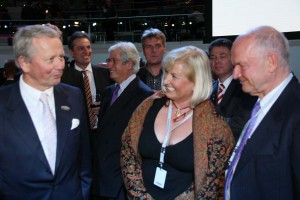
Now kissing cousins? Wolfgang Porsche, (l), and Ferdinand Piech bring two sides of the family together.
The on-again/off-again marriage of Volkswagen and Porsche has been completed, the two German makers saying, “I do” after resolving a list of legal problems that seemed likely, only months ago, to scuttle the proposed alliance.
The tie-up, which actually brings together long-feuding heirs of German automotive legend Ferdinand Porsche was the end result of an unlikely David-v-Goliath bid by the little sports carmaker to acquire its bigger rival.
“The path is now finally clear for a bright future together,” said Martin Winterkorn, chief executive officer of Volkswagen and Porsche SE, in a prepared statement. “Even closer cooperation will enable us to significantly strengthen Volkswagen and Porsche, and further expand the Group’s product portfolio with fascinating new vehicles.”
Porsche now becomes the 12th brand in the Volkswagen stable – an assortment that ranges from the base-priced, Czech-based Skoda to British ultra-luxury marque Bentley. But it may not be the last. The acquisition-minded maker has hinted it could be interested in several other properties and recent reports have suggested VW may make a bit for Malaysia’s Proton and its British subsidiary Lotus Cars. The maker also recently added the Ducati motorcycle brand to its trophy chest.
(For more on that story, Click Here.)
Porsche and VW share common roots, both companies linked to automotive legend Ferdinand Porsche and his heirs. But the makers are strongly influenced by two oft-feuding branches of the family, Wolfgang Porsche overseeing operations at the sports car company and Ferdinand Piech serving as chairman of VW’s supervisory board.
Starting in 2005, Porsche began accumulating Volkswagen stock, setting in motion an unexpected bid to take control of the bigger company. The move eventually collapsed, leaving Porsche with mountains of debt – and plunging it into legal chaos as allegations of irregularities in the takeover bid mounted.
In 2009, to put an end to their feud, the two companies agreed to a merger but the mounting legal issues facing Porsche forced a series of postponements and, just a few months ago, most analysts had concluded the proposed marriage would never be consummated.
But Porsche found a creative way to limit its financial liabilities clearing the way to the corporate altar. VW, in turn, paid the Porsche SE holding company 4.49 billion Euros, or $5.52 billion – and one common share.
That single share allowed VW to avoid a 900 million Euro tax bill by reclassifying the deal as a restructuring, rather than an acquisition.
Both makers recently reported strong earnings despite the sharp downturn in the European automotive market. But shares in both VWAG and Porsche SE fell after the announcement of the merger’s completion.
Holding company Porsche SE plans to use 2 billion Euros from the deal to pay off debt accumulated during the unsuccessful VW acquisition attempt. It will invest the rest, it said, in a variety of new ventures.
